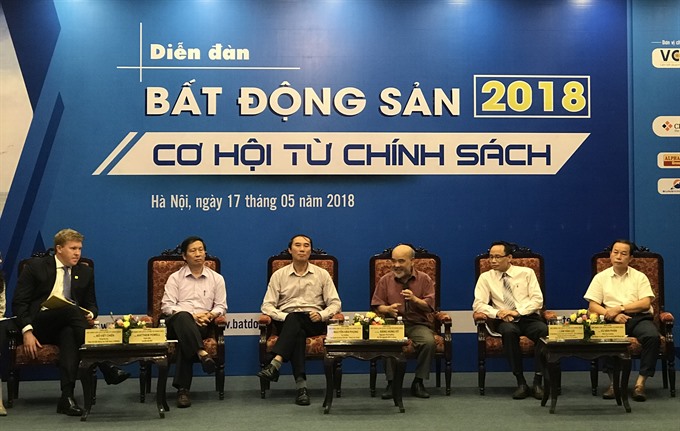Since the real estate market began to recover in 2014, the country’s laws regulating the market have transformed significantly. But as the laws have developed, many of them overlap, creating redundancies that the Government must now try to eliminate.

Since the real estate market began to recover in 2014, the country’s laws regulating the market have transformed significantly. But as the laws have developed, many of them overlap, creating redundancies that the Government must now try to eliminate, Dang Hung Vo, former deputy minister of Natural Resources and the Environment, said at a conference held in Ha Noi on Thursday.
Recently, many have heavily criticised the Ministry of Finance’s proposal to impose an auxiliary property tax rate of 0.3-0.4 per cent on houses worth VND700 million (US$31,000) and up. Additionally, there are many discrepancies between the land law, housing law and laws governing real estate business.
The 2013 Land Law introduced a policy to deal with "suspended projects"— those that have failed to use land for a period of 12 months or that are seriously behind schedule within 24 months of implementation will get an additional 24-month grace period.
After the extension, the State will recollect the land and confiscate all the assets invested on the land by the investors. This means that the investor’s property will be nationalised. But the 2013 Constitution states that the State does not nationalise the legitimate assets of any organisation and citizen. Therefore, the provisions of the 2013 land law should be replaced with policies to punish "suspended projects" with high taxes or administrative penalties, Vo suggested.
Inconsistencies hamper housing growth
The 2003 Land Law allows enterprises to use land they will own for a long time to build housing for their employees. The law is especially intended to encourage businesses to create accommodations for workers in industrial areas, as well as to develop rental housing projects. The 2014 Housing Law continues to regulate businesses’ rights to use residential land they own in accordance with the provisions of the 2003 Land Law.
In contrast, the Land Law of 2013 only allows enterprises to use residential land for a definite term equal to the term for the project as a whole. This provision has made it impossible for businesses to build housing for their employees, while also limiting the development of the rental housing market.
According to Vo, this provision of the Land Law 2013 needs to be renewed to comply with the Housing Law 2014, which allows businesses and organisations to use land for the long-term, with no specifications about when ownership will lapse.
The Housing Law 2014 and the 2014 Law on Real Estate Business allow foreigners who are permitted to enter Viet Nam to purchase houses attached to land for living and for business purposes. This is considered an important innovation to create momentum for market development as international economic integration proceeds. In contrast, the Land Law of 2013 does not provide for the right of foreigners to have access to land in Viet Nam.
In the period from 2014 until today, especially since the government of Viet Nam issued policies to turn tourism into a spearhead economic sector, a series of real estate development projects for tourism and resorts have been built in many tourist areas. However, each locality has introduced different ways of enforcing the law. At the moment, it is necessary to fill the legal gaps regarding the construction of tourism and resort real estate.
From the perspective of mobilising financial capital for market development, the legal system is scattered, with relevant policies strewn across many documents issued by various ministries and branches such as the Ministry of Finance, the State Bank and the Ministry of Construction. This is the hurdle the real estate market faces in mobilising financial resources.
Inadequate financial policy for real estate
As lawmakers seek to resolve discrepancies and harmonise existing law, experts at the conference also said the overall goal of the real estate policy regime should be to provide stability for the market.
According to Can Van Luc, director of BIDV Training School at the Bank for Investment and Development of Viet Nam, real estate finance is a system of mechanisms, policies and markets on taxes, fees, capital sources and financial products. These are essential factors for the real estate market to grow healthily.
However, in the current real estate finance system, there are some limitations. For example, the housing savings fund has not developed mainly due to a lack of capital and operation mechanisms that are unsuitable for the market. In addition, the system of financial institutions is not diversified, which is a barrier to the development of the housing finance market.
In 2018, the Government plans to disburse VND1 trillion for low-income housing loans for social housing. Half will come from the State, while the Viet Nam Bank for Social Policies will mobilise VND500 billion. However, this fund is limited and will be exhausted by only a few large projects.
Luc suggested a long-term common housing savings fund similar to those of Thailand and Singapore. At the same time, medium- and long-term sources of capital must be created and the financial market structure must be balanced, creating capital for housing savings and social housing programmes.
"In addition, it is necessary to focus on attracting foreign direct investment (FDI) in the targeted real estate sector, such as essential and transport infrastructure. Finalising a decree on investment through Public-Private-Partnerships (PPP) would also benefit the sector," Luc said. — VNS





